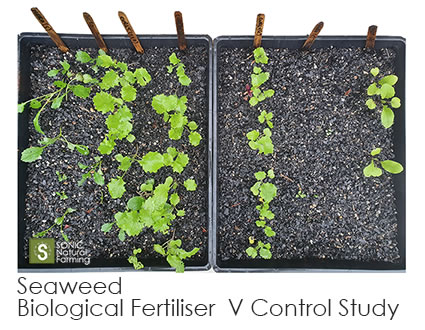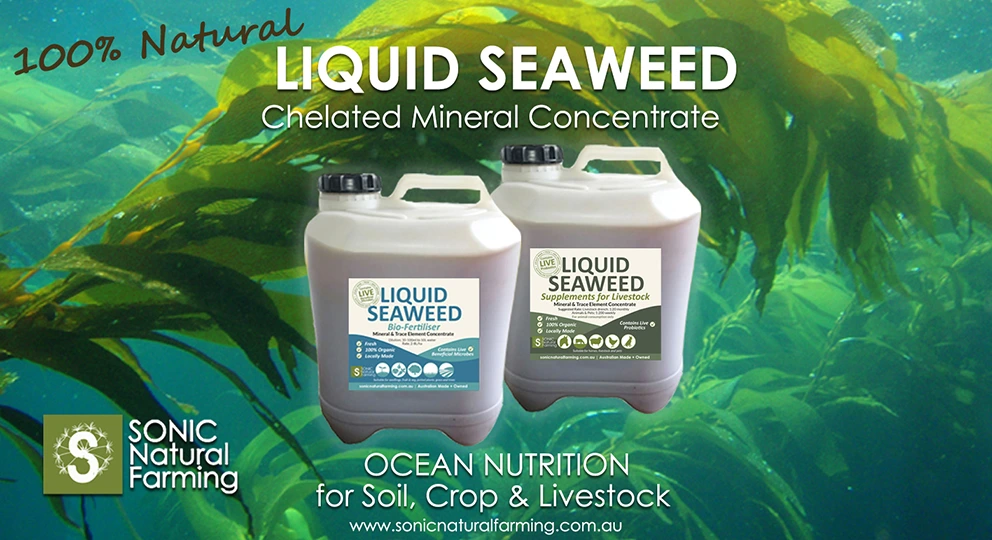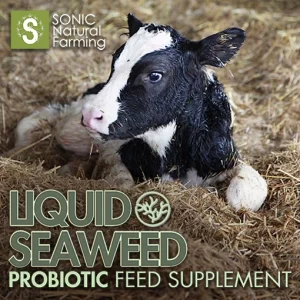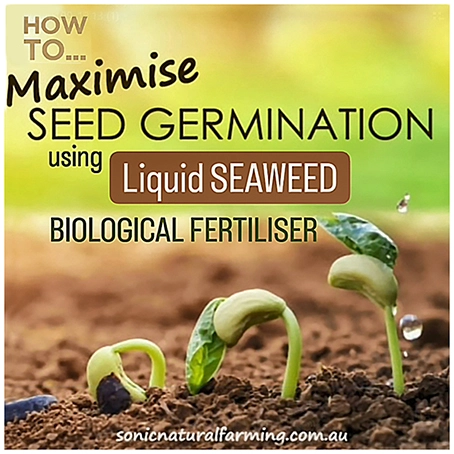Liquid Seaweed Fertiliser has gained popularity among gardeners and farmers due to its numerous benefits for plants. Derived from mineral rich seaweed, this organic fertiliser offers a range of advantages that contribute to the health and growth of plants, as well as benefits to your soil.
1. Delivers Essential Minerals and Trace Elements
One key benefit of using Liquid Seaweed Fertiliser is its rich nutrient content. Seaweed is packed with essential minerals, including nitrogen, phosphorus, potassium, and trace elements such as iron, zinc, and magnesium. These nutrients are vital for healthy plant development and are readily absorbed by plants, promoting robust root growth, improved flowering and fruiting, and overall plant vigor.
Alongside containing essential elements, Liquid Seaweed Fertiliser also contains micronutrients such as iron, copper, zinc, molybdenum, boron, manganese and cobalt.
Plants use tiny amounts of the micronutrients, often measured in parts per million, which is why using Liquid Seaweed Fertiliser as a foliar spray can be an effective way to deliver these micronutrients to the plant.

2. Improved Soil Structure
Liquid Seaweed Biological Fertilisers have gained significant attention in recent years due to their potential to improve soil structure and enhance microbial activity. Fertilisers, derived from seaweed, offer a natural and sustainable alternative to traditional chemical-based fertilisers.
One of the key benefits of using Liquid Seaweed Biological Fertiliser is their ability to promote better soil structure. When applied to the soil, the compounds present in seaweed help bind soil particles together, resulting in improved soil aggregation. This enhanced structure allows for better water infiltration and retention, reducing the risk of erosion and improving overall soil health.
Furthermore, due to the cold processing method to produce Liquid Seaweed Biological Fertiliser, they have been found to also stimulate microbial activity in the soil.
The complex carbohydrates and other organic compounds present in seaweed act as a food source for beneficial microorganisms such as bacteria and fungi. These microorganisms play a crucial role in nutrient cycling, breaking down organic matter, and making essential nutrients more available to plants.

3. Provides Natural Growth Hormones
Seaweeds are rich in naturally occurring hormones such as auxins, cytokinins, and gibberellins. These hormones play a crucial role in regulating various physiological processes in plants, including cell division, elongation, and differentiation.
When Liquid Seaweed Fertilisers are applied to plants, these natural growth hormones are absorbed by the roots and transported throughout the plant’s system. This leads to enhanced root development, increased nutrient uptake efficiency, improved flowering and fruiting, and overall healthier plants.
Natural growth hormones, contained in Liquid Seaweed Fertiliser, provides excellent benefits for seed raising. Seeds inoculated and watered with Liquid Seaweed Fertiliser have been shown to strike better than those using non-seaweed fertiliser.
Seeds treated with Liquid Seaweed Fertiliser have also been studied and shown to grown stronger, faster and more vigorously, and often exhibited increased resistance to environmental stressors such as drought or disease.

4. Enhanced Taste, Colour and Nutrition of Food
One of the key advantages of using Liquid Seaweed Fertiliser is its impact on taste. It has been found that plants treated with Seaweed Fertiliser tend to have improved flavour profiles compared to those grown with chemical-based fertilisers. The natural compounds, present in seaweed, can enhance the overall taste and aroma of fruits, vegetables, and other edible crops.
In addition to enhancing taste, Liquid Seaweed Fertiliser also contributes to enhancing the colour and texture of food. The minerals and trace elements found in seaweed help plants develop vibrant colours and improve the visual appeal of fruits and vegetables. Furthermore, these nutrients promote healthy cell growth in plants, resulting in a desirable texture that consumers appreciate.
Moreover, Liquid Seaweed Fertiliser is known for its ability to enrich the nutritional content of food. Seaweeds contain rich sources of essential minerals such as potassium, magnesium, calcium, iron, and iodine. When used as a fertiliser for plants, these nutrients are absorbed by the crops and subsequently passed on to consumers when they consume these foods. This can contribute to a more nutrient-rich diet for individuals.

5. Increased Plant Immunity Against Diseases and Pests
One of the key advantages of using Liquid Seaweed Fertiliser is its ability to boost a plant’s immune system. Seaweeds are rich in bioactive compounds such as polysaccharides, amino acids, and vitamins that stimulate the production of plant defense mechanisms. These compounds help plants build stronger cell walls, activate defense genes, and produce antimicrobial substances that can fend off diseases and pests.
Liquid Seaweed Fertilisers have shown promising results in enhancing plant tolerance to climatic stresses such as drought, salinity, and extreme temperatures. Seaweeds contain osmoprotectants that help plants retain water during dry periods or excessive salt exposure. They also contain antioxidants that scavenge harmful free radicals produced under stressful conditions.

5 Best Benefits: Liquid Seaweed Fertiliser for Plants Summary
Overall, incorporating naturally fermented Liquid Seaweed Fertilisers into gardening and agricultural practices offers several advantages. Liquid Seaweed Fertiliser is becoming increasingly popular among growers and farmers seeking sustainable ways to enhance crop quality while meeting consumer demands for healthier and more flavorful produce.
Furthermore, Liquid Seaweed Fertiliser aligns with sustainable gardening practices as it is derived from renewable marine resources. It offers an eco-friendly alternative to synthetic chemical fertilisers that may have detrimental effects on the environment.
In conclusion, incorporating Liquid Seaweed Fertiliser into your farming or gardening routine can provide numerous benefits for your plants. From providing essential nutrients to promoting healthy growth and improving soil structure – this organic option proves advantageous for both plant health and environmental sustainability.















